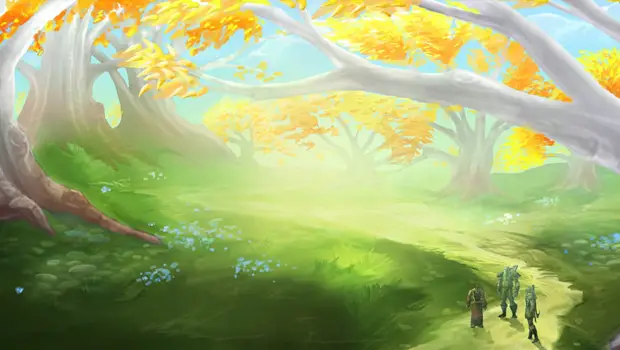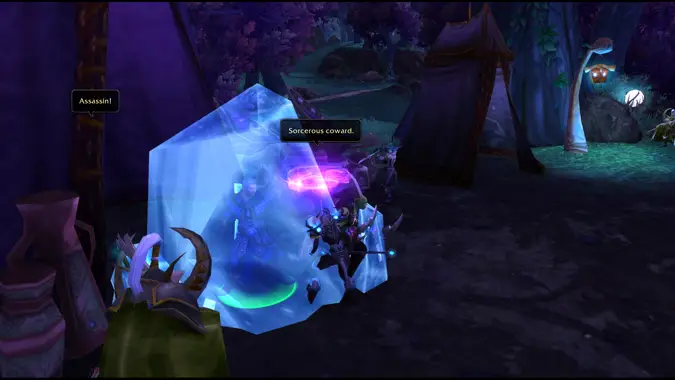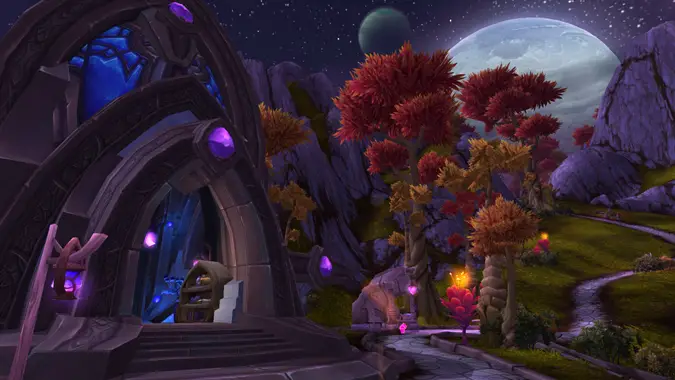Role Play: When a roleplay partner calls it quits

You can be perfectly happy with the game, the people around you, and the roleplay you’ve found, but that’s not always the case for everyone else. So what do you do when you’re in the middle of some really good, long-lasting kind of roleplay, and your roleplay partner suddenly decides they just don’t want to do it anymore? Maybe they just don’t want to roleplay, or they’ve grown tired of the game itself, they can’t afford game time, or maybe they’ve just found another game they like better.
The person playing that character may have all kinds of good reasons for leaving the game, but you’re suddenly left behind with a giant person-sized hole in the story you were so happily working on, and no good in-character explanation for it. Obviously, real life takes priority over whatever’s going on in our in-game world, but how do you compensate or cover for the abrupt departure of an in-character friend or companion?

Story impact
There’s a few different hurdles to consider when a roleplay partner decides to call it quits. First and foremost is the fact that your character suddenly has to deal with the fact that they’ve lost someone close to them, and you’re going to have to figure out how your character is going to process that loss. The nature of that loss is a big question mark as well, unless your friend left a good in-character reason for his departure that everyone can work with.
And by everyone, I mean not just you, everyone that character has been interacting with on any kind of level. If they were involved in any major plots or stories, it’s possible they’re leaving a gap behind that touches an entire roleplay group or guild, not just your character. This means that the people involved in that particular plot are going to need to work together to resolve just what the heck happened in a way that’s satisfactory for everyone involved.
Although it might seem like a horrible thing to lose a roleplay partner, you can turn that unfortunate situation around in a way that works for you. Obviously you aren’t the only one affected by that character’s departure — so now you have a reason for your character to talk to other characters they might not have otherwise interacted with. Rather than focusing on what your character has lost, look instead at the potential situations and opportunities you’ve gained for future roleplay. Sure, it’s irritating to have a story just drop out of existence, but that paves the way for new stories that might just be better than the one you’ve had to unexpectedly leave behind.

Determining fate
If your roleplay partner has been kind enough to leave with some kind of in-character reason for their departure, you’ve got a much easier road ahead of you. It means that everyone will be on the same page, including the departed roleplayer in the event that they decide they’d like to make a return. It also gives you a much better idea of how your character should be reacting to the news that their friend or loved one is gone. If they don’t leave you with an in-character reason for their departure, though, this is something you’re going to have to sort out on your own.
If you know that your friend simply isn’t going to come back to the game, you’re probably safe to assume the idea that their character has died in one way or another. How they died doesn’t really matter so much as the fact that they’re gone — and just in case, you might want to leave the exact details surrounding their demise vague. After all, if your friend does decide to come back, you don’t want to make it impossible for them to do so. This does, however, give your character, and the other characters involved, a chance to grieve, mourn, and move on with some kind of closure and acknowledgment.
If you think there’s a chance that your friend might come back, then you probably want to leave them some kind of method for doing so. In this case, it’s probably safest to just leave things open-ended. Make it a mystery — maybe the character just up and disappeared, which leaves you in a great place to start some kind of search campaign. Of course your characters aren’t going to find anything regarding the mysterious disappearance, but it gives them a reason to start talking to other people.
Or if you want to keep it really simple, just write it off as retirement — the missing character has moved away to a quiet spot in the country, where they are happily spending the day fishing, napping, or doing whatever it is they were happiest doing during down time. If the player eventually returns to the game, they can just say that they’ve decided to come back out of retirement and start saving the world again.

Play nice
If you are going through the process of writing a roleplay partner’s character out of your roleplay, you want to be nice about it. Give them every opportunity and opening you possibly can for the event of an unexpected return, so they have something to come back to. Leave the circumstances of their departure as up in the air as you can manage — even if you’ve decided to write in a character death, make that death as open-ended as possible, so it’s not entirely unheard of for them to show up and announce that they somehow survived. If they do decide to come back to the game, you want them to find a pleasant experience waiting for them — not one that’s just going to drive them right back out the door again.
And if you’re the one taking a break, you want to think about everything we’ve already discussed. Leaving in the middle of big roleplay storylines is perfectly fine — there’s nothing wrong with taking an extended break, leave of absence, or quitting the game entirely. But if you know you’re going to do it, it’s nicest to let people know in advance, and maybe even work in some kind of one last hurrah of a roleplay event where people can get in one last round of good roleplay, and say their goodbyes.
Yes, your character is your character, and you’re the only one that can really determine what happens to them in the end. But you want to remember that your character’s story isn’t just your own — it’s a story that touches however many people you spend time with on any given day. Taking a few minutes to just quickly establish how your character is going to bow out of the picture makes sure that all your friends are on the same page regarding your absence, and gives them something to work with when you’re gone. It’s just the nice thing to do.

If your character has a significant other they are leaving behind, that’s going to require a little more discussion between you and the person roleplaying your character’s partner. It’s one thing to be able to tell someone, “Oh Joe, yes, he moved back out to the country, he still sends us letters every now and again,” it’s another thing entirely to say the same thing about a husband or a wife. Relationships are one of those things everyone seems to enjoy roleplaying — some roleplayers might be content roleplaying in an NPC capacity, others might want the satisfaction of roleplaying in real time.
So what you need to sit down together and decide is whether or not you want that relationship to continue. If the answer is yes on both sides, you can simply leave the situation as-is. If the answer is no, then you should probably come up with some kind of mutual, reasonable explanation for that relationship coming to an end. It doesn’t have to be a terrible break-up, it can just be a amicable parting of ways if you wish — and you can leave that departure open-ended if you’d like to, but be clear that there is no guarantee these two characters will reconcile if you do decide to return.
Having a roleplaying partner suddenly decide to take a lengthy break or quit isn’t really as end of the world as it might first seem. If you handle the situation appropriately, you may even end up with more roleplay than you had while they were still around. Just be conscious of the feelings of the departing player, make your own feelings known, and get a satisfactory resolution figured out. Stories work their best when they have a definitive ending — you want to make sure you establish a good one for yourself, and for everyone involved.
Please consider supporting our Patreon!
Join the Discussion
Blizzard Watch is a safe space for all readers. By leaving comments on this site you agree to follow our commenting and community guidelines.
 @Shadesogrey
@Shadesogrey



